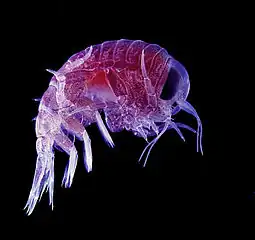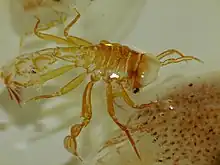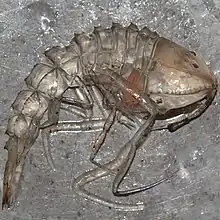| Hyperiidea | |
|---|---|
 | |
| Hyperia (Hyperiidae) | |
| Scientific classification | |
| Domain: | Eukaryota |
| Kingdom: | Animalia |
| Phylum: | Arthropoda |
| Class: | Malacostraca |
| Superorder: | Peracarida |
| Order: | Amphipoda |
| Suborder: | Hyperiidea H. Milne-Edwards, 1830 |
| Families | |
|
See text | |
The Hyperiidea are a suborder of amphipods, small aquatic crustaceans. Unlike the other suborders of Amphipoda, hyperiids are exclusively marine and do not occur in fresh water. Hyperiids are distinguished by their large eyes and planktonic habitat. Most species of hyperiids are parasites or predators of salps and jellyfish in the plankton, although Themisto gaudichaudii and a few relatives are free-swimming predators of copepods and other small planktonic animals.
Gallery
.jpeg.webp) Specimen of Streetsia challengeri (Oxycephalidae)
Specimen of Streetsia challengeri (Oxycephalidae) Specimen of Phronima sedentaria (Phronimidae)
Specimen of Phronima sedentaria (Phronimidae).jpeg.webp) Specimen of Themisto (Hyperiidae)
Specimen of Themisto (Hyperiidae) Specimen of Cystisoma (Cystisomatidae)
Specimen of Cystisoma (Cystisomatidae)
Taxonomy
According to Vinogradov et al. in 1996,[1] 233 species of Hyperiidea are known.
Some controversy exists as to the number of families in the Hyperiidea, being given as between 20 and 23 depending on whether groups like the Thaumatopsidae are considered distinct or not. The taxonomy of Hyperiidea currently accepted by the World Register of Marine Species is as follows:[2]
- Infraorder Physocephalata Bowman & Gruner, 1973
- Parvorder Physocephalatidira Bowman & Gruner, 1973
- Superfamily Phronimoidea Rafinesque, 1815
- Family Bougisidae Zeidler, 2004
- Family Cystisomatidae Willemöes-Suhm, 1875
- Family Dairellidae Bovallius, 1887
- Family Hyperiidae Dana, 1852
- Family Iulopididae Zeidler, 2004
- Family Lestrigonidae Zeidler, 2004
- Family Phronimidae Rafinesque, 1815
- Family Phrosinidae Dana, 1852
- Superfamily Platysceloidea Spence Bate, 1862
- Family Amphithyridae Zeidler, 2016
- Family Anapronoidae Bowman & Gruner, 1973
- Family Brachyscelidae Stephensen, 1923
- Family Eupronoidae Zeidler, 2016
- Family Lycaeidae Claus, 1879
- Family Lycaeopsidae Chevreux, 1913
- Family Oxycephalidae Dana, 1852
- Family Parascelidae Bovallius, 1887
- Family Platyscelidae Spence Bate, 1862
- Family Pronoidae Dana, 1852
- Family Thamneidae Zeidler, 2016
- Family Tryphanidae Boeck, 1871
- Superfamily Vibilioidea Dana, 1852
- Family Cyllopodidae Bovallius, 1887
- Family Paraphronimidae Bovallius, 1887
- Family Vibiliidae Dana, 1852
- Superfamily Phronimoidea Rafinesque, 1815
- Infraorder Physosomata Pirlot, 1929
- Parvorder Physosomatidira Pirlot, 1929
- Superfamily Lanceoloidea Bovallius, 1887
- Family Chuneolidae Woltereck, 1909
- Family Lanceolidae Bovallius, 1887
- Family Megalanceolidae Zeidler, 2009
- Family Metalanceolidae Zeidler, 2009
- Family Microphasmidae Stephensen & Pirlot, 1931
- Family Mimonecteolidae Zeidler, 2009
- Family Prolanceolidae Zeidler, 2009
- Superfamily Scinoidea Stebbing, 1888
- Family Archaeoscinidae K. H. Barnard, 1930
- Family Microscinidae Zeidler, 2012
- Family Mimonectidae Bovallius, 1885
- Family Mimoscinidae Zeidler, 2012
- Family Scinidae Stebbing, 1888
- Superfamily Lanceoloidea Bovallius, 1887
Distribution
Hyperiidea are known from many oceans of the world, including 69 species in the Southern Ocean.[3]
References
- ↑ Vinogradov, M. E.; A. F. Volkov & T. N. Semenova (1996). Hyperiid amphipods (Amphipoda: Hyperiidea) of the world. Lebanon, N. H.: Science Publishers. ISBN 1-886106-48-7.
- ↑ "Hyperiidea". WoRMS. World Register of Marine Species. Retrieved 2 July 2020.
- ↑ C. De Broyer; K. Jazdzewski (1993). "Contribution to the marine biodiversity inventory: A checklist of the Amphipoda (Crustacea) of the Southern Ocean". Doc Trav Inst R Sci Nat Belg. 73. Archived from the original on 2011-07-06. Retrieved 2006-02-02.